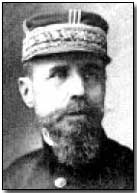Who's Who - Henri Gouraud
 Henri Joseph Etienne Gouraud
(1867-1946) served in active field command positions during World War One,
losing an arm at Gallipoli before performing with distinction at the Marne
in 1918.
Henri Joseph Etienne Gouraud
(1867-1946) served in active field command positions during World War One,
losing an arm at Gallipoli before performing with distinction at the Marne
in 1918.
Gouraud entered St. Cyr in 1888, receiving his commission into the infantry two years later. His pre-World War One service was spent almost exclusively away from France, notably in Morocco, where he gained acquaintance with future Commander-in-Chief Joseph Joffre.
Immediately prior to the outbreak of hostilities in August 1914 Gouraud was promoted Brigadier-General and was still in Morocco when news of war came through. Gouraud was placed in command of 10th Division until, in May 1915, he was charged with command of the French expeditionary force destined for the Dardanelles campaign.
During the course of his Dardanelles service the popular Gouraud broke both legs and lost an arm on 30 June 1915 as the result of fragments from a shell explosion; King George V was sufficiently concerned to despatch a telegram of regret to British regional Commander-in-Chief Sir Ian Hamilton upon hearing the news.
Following the briefest period of recuperation Gouraud returned to active service within six months, this time to lead Fourth Army in Champagne. With Hubert Lyautey's appointment as War Minister in December 1916 Gouraud replaced him as resident general in Morocco.
Lyautey's spell as War Minister was short-lived however; following a fundamental difference of opinion regarding French Commander-in-Chief Robert Nivelle's planned Aisne Offensive Lyautey opted to resign on 14 March 1917, an act that brought down Aristide Briand's government. With Lyautey's resignation he returned to Morocco, once again as resident general. Similarly Gouraud returned to Champagne at the head of Fourth Army in July 1917.
Crucially holding some 80km of the front around Champagne Gouraud issued his renowned "stand or die" command to his army (which included U.S. troops).
Fourth Army played a significant role in halting the German offensive during the Second Battle of the Marne, where his albeit-reluctant adoption of Commander-in-Chief Henri-Philippe Petain's policy of elastic 'defence in depth' (where the front line trenches were lightly held with defences growing in strength further back) caused the Germans to quickly become bogged down (click here to read Gouraud's appeal to his forces during the battle).
Gouraud's actions during this action led to his nickname as "the Lion of Champagne". Following success at the Marne Gouraud's Fourth Army promptly switched to the offensive in September 1918 at Villers-Cotterets.
After the armistice Gouraud was appointed High Commissioner of Syria and then as commander in the Levant from 1919-23. This was followed by the governorship of Paris and membership of the Supreme Allied War Council from 1923-1937.
Finally retiring in 1937 Gouraud died in 1946.
The first zeppelin raid on London was on 31 May 1915. Earlier raids in January 1915 had avoided London. The London raid resulted in 28 deaths and 60 injuries.
- Did you know?
